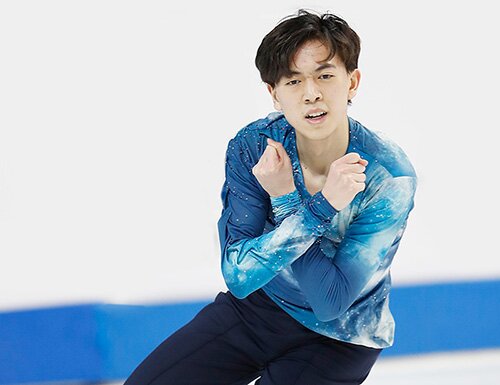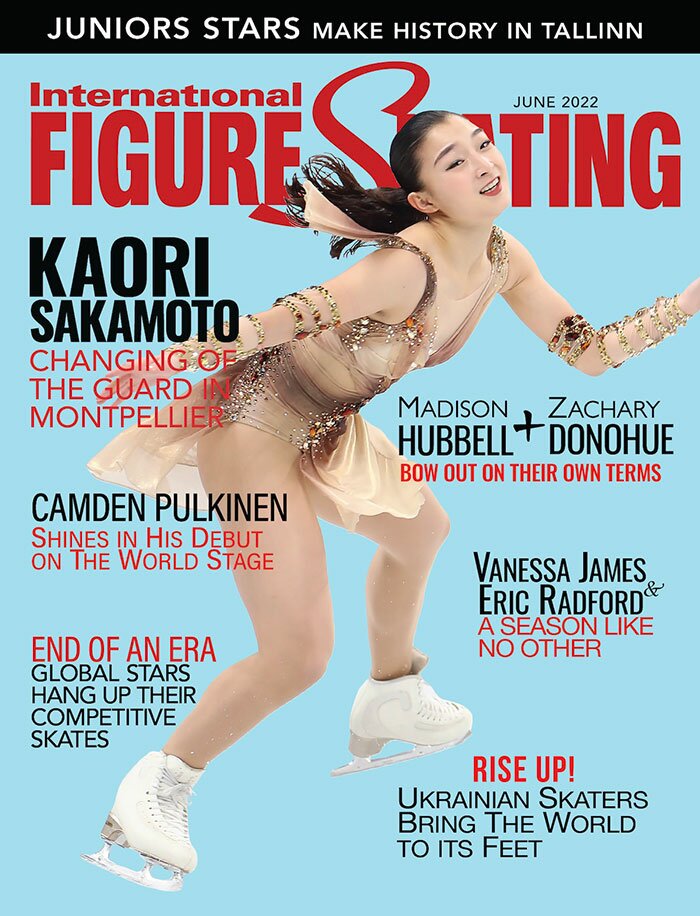

To say it was a tumultuous year for Vincent Zhou would be an understatement. Fresh off his first podium finish at a World Championships in 2019, he had hoped to carry the momentum of that bronze medal triumph into his summer preparation for the upcoming season. However, a series of injuries and a move across the country to begin his freshman year at Brown University derailed that plan.
Zhou was on a high as the 2019 New Year unfolded. A second-place finish at U.S. nationals earned him a trip to the World Championships, where he finished third in a tough field. He went back to Japan a month later for the World Team Trophy as a member of the gold-medal winning American contingent.
Upon his return to the U.S., he joined the Stars on Ice tour. That marked the beginning of a series of injuries and life changes that would continue for the next nine months. While performing at the tour’s stop in Long Island, New York, in late April, Zhou took a bad fall, suffering a high-grade partial tear of the posterior cruciate ligament in his left knee. The injury kept him out of action for two months.
In July, he scheduled a trip to Japan to work with coach Mie Hamada in Osaka, the timing of which coincided with a series of “The Ice” shows that toured that nation in late July and early August.
At the end of one of those shows, Zhou dislocated his shoulder, which took him off the ice for more than a month. He finally returned to his training base in Colorado Springs, just 10 days before he had to leave for college. “Every summer I tell myself it can’t possibly get harder than it was last summer, but I keep on unpleasantly surprising myself with these unfortunate situations. You have to roll with the punches that life deals you, but it wasn’t easy at all.”
Zhou arrived at Brown ready to take on the rigorous coursework required of an Ivy League school, and was confident he would be able to juggle his schedule to also allow for solid training time at a rink. He quickly discovered, however, that the resources he needed to train at the level to which he was accustomed were not available in Providence, Rhode Island.
There was little to no ice time available at the Meehan Auditorium (the main athletic complex at Brown) and, even if there had been, Zhou said it would be almost impossible to train there because “the ice was so thin that my toe pick would hit sand on the triple Lutz. There were also some hockey coaches complaining about my skating causing permanent damage to the ice, so it was not a good fit.”
Zhou had no choice but to adjust to this new reality, and began to rely on off-ice training to at least keep his fitness at a level necessary for an elite athlete. “The main gym at Brown was too far from my dorm, but there happened to be a smaller one nearby, so I would use it,” said Zhou. “I would FaceTime with my trainer at the U.S. Olympic Training Center, who gave me routines to make sure I was on top of everything again.”
Though he had a plan in place to maintain his off-ice fitness, Zhou still needed to find a place to train. His immediate thought was to work with Mark Mitchell and Peter Johansson in Boston, given that city’s proximity to the Brown campus. “We started going there, but it was really difficult,” Zhou recalled. “When we traveled there and back, we would hit rush hour both ways. The total commute each day would be like four hours. That was really hard, so eventually we started looking around for other rinks, but everything that had what I needed was about 40 minutes away from campus.”
Despite not having trained on a regular basis, Zhou went to the U.S. International Figure Skating Classic in Salt Lake City, Utah, in September 2019. He arrived at the competition less prepared than he would have liked, and finished in a disappointing third place. When he returned to campus, Zhou could feel the wheels were coming off the proverbial cart. He had always known that balancing school and skating was going to be a tall order, but had hoped that everything would fall into place once he got into a routine. With all his on-ice options exhausted, Zhou realized it might be time for his skating career to take a back seat while he completed his first semester at Brown.
“Not only was it hard finding ice time and a consistent place to train, but it was also difficult to split the focus between skating and school,” Zhou explained. “It just felt like I couldn’t succeed at either — or at least concentrate and achieve my best potential in either one. If I’m going to do something, I really want to be fully invested in it and be able to apply myself to it every single day. Everybody is different, but for me, it just wasn’t realistic.”
In October, Zhou announced his decision to withdraw from his two Grand Prix assignments to focus on his studies. He still hoped to resume training and compete at the 2020 U.S. Championships, and continued his search for a new training base. When Hamada mentioned that Lee Barkell at the Granite Club in Toronto might be a good fit, Zhou began considering him as an option. “During my time at college I knew it was time for a change. I needed something new, something different. I had heard very good things about Lee from people I trusted, so I decided to give it a go. I traveled to Toronto during the Thanksgiving break to work with Lori (Nichol) and meet with him to talk a little bit about plans for the future.”
Zhou felt comfortable with what Barkell had to offer and began to make plans to join his training group after the semester was complete. He arrived in Toronto three weeks before the 2020 U.S. Championships and, understandably, Zhou was uncertain about his readiness for that competition. “It was really scary,” he admitted. “Making the move was a big step — it was like stepping into the unknown. You don’t know what’s going to happen in the near future or the very far future. I didn’t even know if competing at the U.S. Championships was possible. We just took it one day at a time.”
The first order of business, according to Barkell, was to evaluate Zhou’s training habits and get a sense of how committed he was to getting back in shape. Barkell was impressed with what he observed. “When you take on a new student it takes a little bit of time to get to know them. My number one thing was to see how serious he was about this, and right from the first session I definitely got the impression that he meant business, which was great.”
Barkell then crafted a training plan that would require Zhou to exercise restraint and not rush into doing tricks that were beyond his current capabilities. With the clock ticking, he chose to evaluate Zhou’s progress and condition on a daily basis and adjust the training plan accordingly. “I guess it was a balance of trying to get ready quickly and being smart about how to train,” Barkell explained. “Vincent had been off the ice for quite a while. You can’t go full tilt, or he’s just going to get injured again.
“We kind of treated it as one session and one day at a time. The main emphasis was to get him back into shape with good stamina to get through his programs, and then realistically decide what we could do in the programs from a technical standpoint.”
Zhou admitted that Barkell’s approach helped him learn how to be more patient with his training. Though he sometimes found himself wanting to push it a bit further than Barkell had planned, Zhou believed it was important to follow his instructions. “I think that is an ability I gained recently — to hold back when appropriate is easier than it was before. Maybe that’s why I was injured so much in the past — trying stuff that I should not have been trying. At the same time, if I had not been trying stuff I shouldn’t have been trying, I would not have had quads in the first place.”
By the time the U.S. Championships rolled around, Zhou felt prepared enough to give it a go and, accompanied by Barkell, headed to Greensboro, North Carolina. “Deciding to compete at nationals with such a short time to prepare is not something that a lot of people can do,” said Zhou. “Even though I didn’t have that much time, I did my best to get myself into somewhat presentable shape and I tried my best.”
Although he was tentative in Greensboro, Zhou managed to check off all the technical elements without making any major mistakes and, despite his lack of training time, landed a quad Salchow in both the short and long programs. He finished in fourth place and was named to the 2020 World Championships team. “Obviously, it was about as good as I could have possibly done at that moment,” the 19-year-old explained. “I have more in my tank for the future, but for me, just overcoming everything that I had been through in the second half of last year was a huge, huge personal victory. It was really special to be able to go out there and do that.”
Zhou, like everyone else, was disappointed that the World Championships were cancelled. “I stuck to the training plan, kept my head level, and made progress every week,” he explained. “There were ups and downs, but I eventually got to where I somewhat needed to be to have a chance of reaching my goal at Worlds. I was training quads and had made significant progress with my skating skills and spins. I had multiple technical specialists and judges look at my levels and Grades of Execution to make sure I was checking boxes and beyond. I did all I reasonably could in six weeks of training.”
He has now shifted his focus to what comes next. Zhou has taken a sabbatical from Brown until after the 2022 Winter Olympic Games in Beijing and will be getting back to the grind with Barkell in preparation for the upcoming season as soon as he is able to cross the US/Canadian border. He is currently training at the Broadmoor Arena in Colorado Springs.



